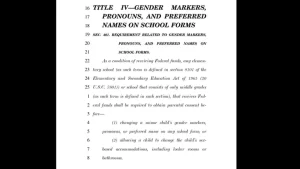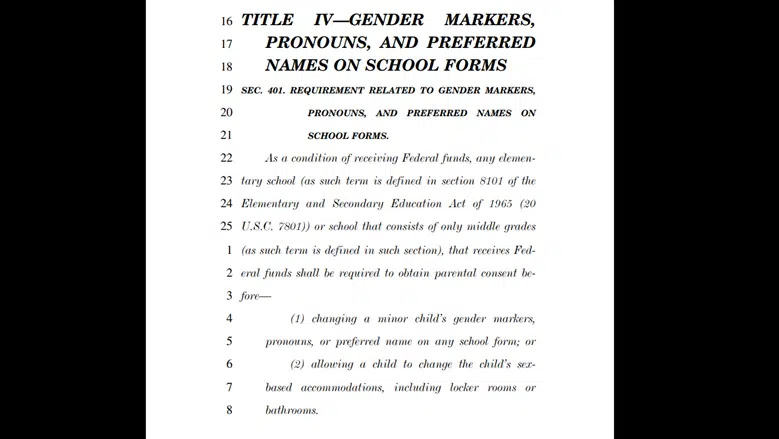House GOP bill would let boys go into girls’ bathrooms and locker rooms (and vice versa) in elementary and middle schools with their parents’ permission—whether states like it or not.

Title IV of H.R. 5, “parental rights” legislation that purports to address the issue of minor gender transition taking place in public schools, where children are being transitioned from one gender to another—by changing a child’s gender, pronouns or name on school forms, or by allowing a child to use the opposite sex’s locker rooms and bathrooms—actually allows it to take place with the parents’ permission, whether states agree or not.
The section states, “As a condition of receiving Federal funds, any elementary school … or school that consists of only middle grades (as such term is defined in such section), that receives Federal funds shall be required to obtain parental consent before… changing a minor child’s gender markers, pronouns, or preferred name on any school form; or … allowing a child to change the child’s sex-based accommodations, including locker rooms or bathrooms.”
The intent of this provision is to ensure that a school receiving federal funding cannot transition the gender of a child without the parents’ knowledge and consent.
In Suffolk County, N.Y. one family is suing their school after a Port Jefferson teacher forced a 9-year-old girl to use male pronouns and to go by the name of “Leo,” causing the girl to experience suicidal thoughts.
This part of the legislation does in fact address that by setting up a significant prohibition against the practice when it occurs without a parent’s consent, which absolutely should not be occurring.
But on the other side of the issue, what the provision also does is to authorize parents to grant consent for schools to transition the gender of a child as an official matter on school forms and, critically, to provide accommodations for the child including access to the opposite sex’s bathrooms and locker rooms—whether other parents with children attending the school agree to the practice or not—as a matter of federal law.
Making matters worse, because it would be a federal law, if adopted by both the House and Senate and signed by President Joe Biden, it could potentially preempt any state laws that might seek to completely prohibit schools from accommodating minor gender transition in any way. What about federalism? Why should a federal education bill potentially impose such a requirement on states?
Mind you, this is the Republican bill on minor gender transition as it takes place in public schools nationwide, and it actually allows the practice to continue—with parents’ permission—whether Republican-led states like it or not. Why would they do that?
In other words, if there is to be national legislation about this issue, foregoing any states’ rights considerations, why aren’t they just banning it by saying no funds for schools that accommodate minor gender transition, especially in elementary and middle schools? Instead, they’re saying it’s okay with parental consent. Is it?
That, even though Republicans are overwhelmingly opposed to allowing schools to teach about gender identity in schools—at all. A YouGov poll from March 2022 found that Republicans oppose gender identity curricula 65 percent to 21 percent. Independents are opposed 45 percent to 31 percent. Democrats favor it 69 percent to 17 percent. U.S. adults were split, with 41 percent opposed and 40 percent in favor.
On allowing student athletes to compete against the opposite sex on sports teams, Republicans are opposed 77 percent to 12 percent. Independents are opposed 57 percent to 22 percent. And Democrats are in favor, 53 percent to 24 percent. U.S. adults overall are opposed 49 percent to 29 percent.
On the issue of allowing the use of puberty blockers, Republicans are opposed 72 percent to 12 percent. So are independents, 46 percent to 24 percent. Democrats are in favor, 49 percent to 24 percent. Overall, U.S. adults are opposed, 44 percent to 29 percent.
Meaning, if it were a national referendum, the United States might simply ban the practice of minor gender transition altogether. It’s not even close.
So, why would the Republican legislation on this matter require public schools nationwide to accommodate minor gender transition officially on school forms and to permit children to use the opposite sex’s bathrooms and locker rooms with parental consent?
If Republicans don’t want gender identity taught in classrooms, why would they want it taught in school bathrooms and locker rooms? It is rather inexplicable—and puts the power in the hands of the most radical parents who are pushing this.
And on the issue of requiring schools to notify a parent if a child requests to use different pronouns at a school, Republicans are in favor, 63 percent to 22 percent. Independents are in favor, 50 percent to 19 percent. Democrats are in favor, 46 percent to 31 percent. And U.S. adults are in favor, 52 percent to 24 percent.
On this count, the legislation would also establish a parental “right to know” if a school allows employees to attempt to transition the gender of a child on school forms and by allowing children to use the bathrooms and locker rooms of the opposite sex by posting that information the school’s website.
That, coupled with the prohibition on child gender transition without parental consent appears to be the part that the legislation does address, by carving out some sort of “reasonable” middle ground by providing for some parental notification when this is occurring. But why didn’t it go further? With Democrats completely opposed to the bill, its prospects in the Senate are dim anyway, let alone getting signed into law.
H.R. 5 goes way too far. As a federal law it would preempt states that might wish to prohibit minor general transition at schools altogether, especially in elementary and middle schools. Why would the GOP-led House—which has said it wants to let states control education—do that?
Robert Romano is the Vice President of Public Policy at Americans for Limited Government.
